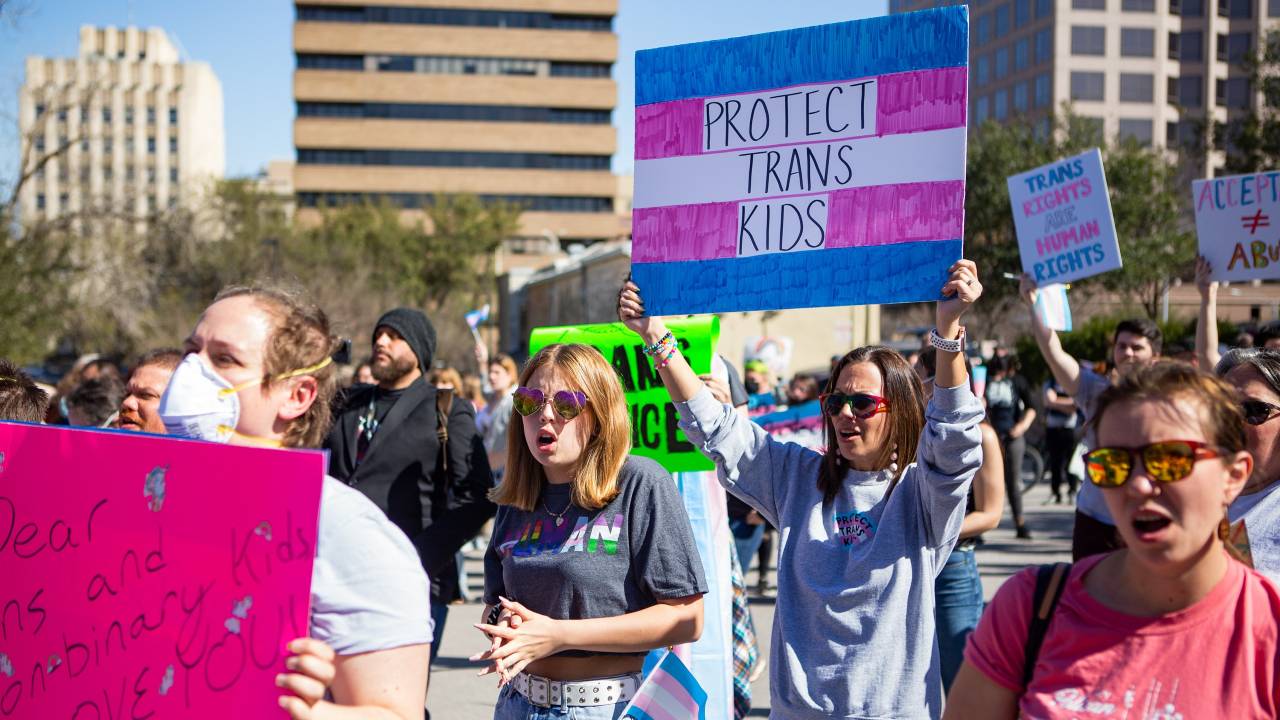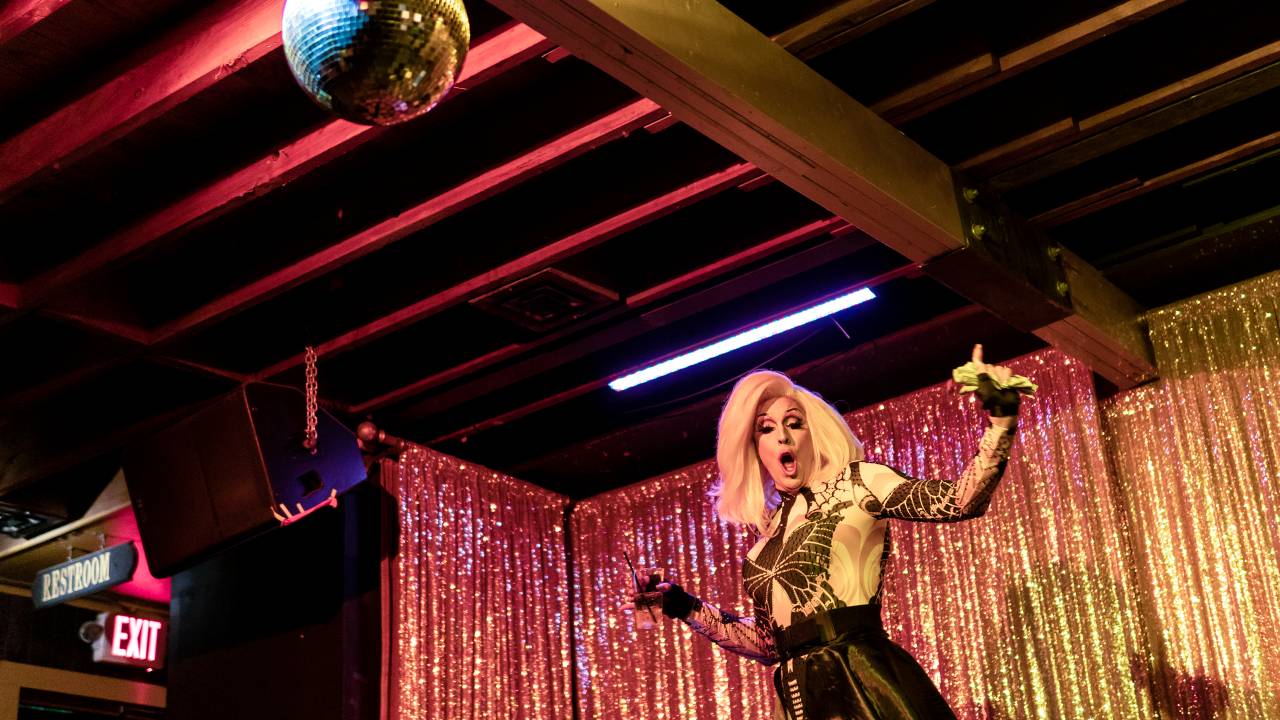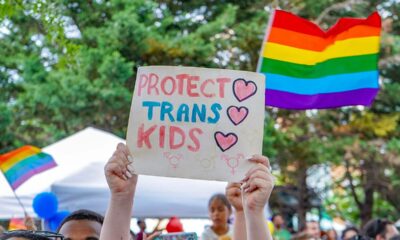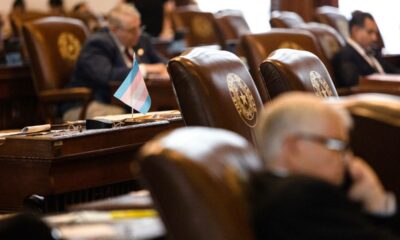88th Texas Legislature
Texas Senate scales back proposed restrictions on puberty blockers and hormone therapy for transgender kids
Senate Bill 14 would now allow trans children who are already receiving some transition-related treatments to continue getting that care. The Senate gave initial approval to the reworked legislation Wednesday.

This article originally appeared in The Texas Tribune
 The Texas Senate on Wednesday gave initial approval to a bill that would ban puberty blockers and hormone therapy for transgender youth wanting to gender transition if they are not already receiving such care. Major medical groups approve of such care and say it lessens higher rates of depression and suicide for trans youth.
The Texas Senate on Wednesday gave initial approval to a bill that would ban puberty blockers and hormone therapy for transgender youth wanting to gender transition if they are not already receiving such care. Major medical groups approve of such care and say it lessens higher rates of depression and suicide for trans youth.
Senate Bill 14 author Sen. Donna Campbell, R-New Braunfels, made a last-minute change on the chamber floor Wednesday that limited the scope of the legislation. The bill previously would have banned several transition-related treatments outright. On Wednesday, Campbell amended the legislation to allow children who are currently receiving puberty blockers and hormone therapies to continue such treatments if the bill is signed into law and takes effect.
That means SB 14 would ban puberty blockers and hormone therapies only for children who are not receiving it by early June.
The bill also bans transition-related surgeries, though they very rarely happen for trans youth. Health care providers also would not be eligible for financial reimbursement through Medicaid and the child health program for such treatments.
Johnathan Gooch, communications director for Equality Texas, said LGBTQ advocates and Texans are “deeply grieved” that SB 14 is advancing. He said it was “prudent” to allow kids already receiving puberty blockers and hormone therapy to continue such treatment but still considered the bill harmful.
“Trans kids of the next generation should not be disadvantaged because fear-mongering politicians decided to listen to their demons rather than their doctors,” he said in a statement to The Texas Tribune.
Campbell painted doctors providing transition-related care as opportunists capitalizing on a “social contagion” with treatments that lack sufficient scientific data that could determine whether the care is safe and effective.
But in an hourslong Senate committee hearing about the bill, medical groups testified about the wealth of scientific evidence backing mental health benefits of transition-related care for transgender youth. Trans youth who take puberty blockers are significantly less likely to experience lifelong suicidal ideation than those who want the care and don’t get it, according to recent studies.
Over the objections of hundreds of doctors, medical groups and LGBTQ Texans, Republican lawmakers have said the legislation is needed to protect children and that medical studies don’t support the benefits of such care.
“This is not science-based practice,” Campbell said Wednesday.
During the chamber debate, Democratic Sen. José Menéndez of San Antonio also introduced two floor amendments, including one that sought to ban conversion therapy, which aims to change someone’s sexuality. Both measures failed. The Senate voted 19-12 along party lines for SB 14, which is one of Lt. Gov. Dan Patrick’s priorities this session.
Under the amended bill, families have a shrinking window to begin this treatment before June 3.
Landon Richie, policy associate with the Transgender Education Network of Texas, said if the bill is “increasing the burden on families who may be in line for appointments to receive this care, but if time runs out before they receive it, they’re not going to get care in this state.”
Richie said many families don’t have the resources to leave the state to get this care, which will significantly restrict what treatment is available to address the mental health challenges trans youth experience.
The bill will make its way to the lower chamber after a final vote in the Senate. In 2021, a bill similar to SB 14 was passed in the Senate but died in the Texas House. But this year, a majority of House members — all of them Republican — have signed on as authors or co-authors to House Bill 1686, which is more restrictive than the new version of SB 14. HB 1686 amounts to an outright ban on transition-related care for kids. HB 1686 was debated Monday, but has not yet been approved by the House Public Health Committee, which includes three openly LGBTQ lawmakers, all of them Democrats.
The House legislation saw overwhelming public opposition, as more than 2,800 people registered against the bill while just under 100 people expressed support. The bill’s opponents criticized Rep. Stephanie Klick, a Fort Worth Republican who chairs the committee, for cutting off testimony before hundreds of people could testify against it in person. Though several trans youths and their parents were able to make their case to the lawmakers.
Sunny Bryant, a nine-year-old trans girl from Houston who testified late in the night, said she had to miss school to wait for her chance to speak.
“If you pass this bill and we stay in Texas, I’d grow up looking like my dad and that’s a scary thought,” she said to laughter in the room. “I want to grow up looking like me — nobody else, just Sunny.”
Some parents also spoke through tears about how this legislation, if enacted, would push them out of a state that they have deep ties to so that their kids could continue accessing hormone therapy and puberty blockers.
“I’d have no choice but to leave this state,” said Lisa Stanton, mother to Maya Stanton, a 12-year-old trans girl from Houston.
She has a job that could allow her to relocate, but her husband’s work is in Texas.
“We have literally been having conversations about whether we will have to separate and move somewhere else and have him just visit us on the weekends,” Lisa Stanton said. “This is ruining our lives.”
And for some older trans youth, the legislation is already making them rethink where they want to build their future. On the same day as the House committee hearing, Topher Malone, a trans high school senior from Round Rock, received Rice University’s notice about whether or not the Houston college had accepted her. But she didn’t bother checking to see if she was admitted.
“I don’t want to stay here for college anymore, because of what this state government is doing to trans people like me and I can’t stand it anymore,” Malone testified.
Sen. John Whitmire, D-Houston, arguing against SB 14, said he’s built relationships with families of trans youth and urged the Senate to leave decisions about gender-affirming care up to parents. He noted he’s been a lawmaker for 50 years, but this issue was only recently debated at the Capitol.
“I would pray that it’s not just politics but it’s genuine concern for the health and welfare of the transgender children,” Whitmire said. “Let’s remember that the transgender children are God’s creations and we love them.”
The bills restricting transition-related health care are among a slew of legislation Republican lawmakers are pushing that could upend several facets of LGBTQ Texans’ lives. During this month’s hearing on SB 14, GOP activist Steven Hotze went on an anti-trans tirade, calling doctors who provide this type of health care “pedophiles.” Menéndez asked Hotze not to lob baseless and incendiary attacks. Menéndez said trans people are “living their true selves.”
A new research brief by the Trevor Project, a national LGBTQ youth suicide-prevention organization, found that trans kids who come out before age 13 experience higher rates of discrimination, physical harm and suicide attempts than those who come out after that age.
“Right now, transgender and nonbinary young people in the U.S. are dealing with an impossible duality: visibility and understanding of trans people are at an all-time high, and yet, at the same time, they are witnessing a historic wave of anti-trans political attacks all across the country,” Dr. Jonah DeChants, senior research scientist at The Trevor Project said in a statement to the Tribune.
The study found that those whose gender identity is met with a high amount of family support have significantly better mental health outcomes.
“Taking even small steps to support the trans young people in our lives can be, quite literally, life-saving.”
William Melhado and Sneha Dey contributed to this story.
Disclosure: Equality Texas and Rice University have been financial supporters of The Texas Tribune, a nonprofit, nonpartisan news organization that is funded in part by donations from members, foundations and corporate sponsors. Financial supporters play no role in the Tribune’s journalism. Find a complete list of them here.
The Texas Tribune is a nonpartisan, nonprofit media organization that informs Texans — and engages with them – about public policy, politics, government and statewide issues.
88th Texas Legislature
Texas’ ban on certain drag shows is unconstitutional, federal judge says
Senate Bill 12 would have prohibited performers from dancing suggestively or wearing certain prosthetics in front of children. Critics sued the state, saying it violated the First Amendment.

This article originally appeared in The Texas Tribune
 Texas cannot enforce a new law that restricts some public drag shows, a federal judge said Tuesday in declaring the legislation unconstitutional.
Texas cannot enforce a new law that restricts some public drag shows, a federal judge said Tuesday in declaring the legislation unconstitutional.
U.S. District Judge David Hittner found Senate Bill 12 “impermissibly infringes on the First Amendment and chills free speech.” The struck-down law prohibited any performers from dancing suggestively or wearing certain prosthetics in front of children.
Hittner ruled that language discriminated based on viewpoint and is unconstitutionally overbroad and vague.
“The Court sees no way to read the provisions of SB 12 without concluding that a large amount of constitutionally-protected conduct can and will be wrapped up in the enforcement of SB 12,” the ruling reads. “It is not unreasonable to read SB 12 and conclude that activities such as cheerleading, dancing, live theater, and other common public occurrences could possibly become a civil or criminal violation.”
The plaintiffs who sued the state celebrated the order, saying in statements shared by their lawyers that the decision affirmed their rights to express themselves.
“I am relieved and grateful for the court’s ruling,” drag performer Brigitte Bandit said. “My livelihood and community has seen enough hatred and harm from our elected officials. This decision is a much needed reminder that queer Texans belong and we deserve to be heard by our lawmakers.”
Republican state Sen. Bryan Hughes, who authored SB 12, defended the bill and pledged to challenge the ruling. The Texas Attorney General’s Office will appeal the ruling, a spokesperson said.
“Surely we can agree that children should be protected from sexually explicit performances. That’s what Senate Bill 12 is about,” Hughes said. “This is a common sense and completely constitutional law, and we look forward to defending it all the way to the Supreme Court if that’s what it takes.”
Critics of the bill, though, say that Republican lawmakers and officials this year have incorrectly — and unfairly — portrayed all drag performances as inherently sexual or obscene.
While SB 12 was originally billed as legislation that would prevent children from seeing drag shows, the final version did not directly reference people dressing as the opposite gender.
However, Republican leaders, including Gov. Greg Abbott, made it clear that drag shows were the bill’s target — comments and history that Hittner wrote “the court cannot ignore.”
Last month, Hittner temporarily blocked SB 12 from taking effect on Sept. 1 after a two-day hearing for a lawsuit filed against the state by a drag queen and LGBTQ+ groups.
LGBTQ+ Texans, advocates, artists and business groups who sued the state, argued that the law discriminates against the content of performances and restricts equally protected free expression that is protected under the First and 14th Amendments.
In Tuesday’s 56-page ruling, Hittner noted a survey of court decisions “reveals little divergence from the opinion that drag performances are expressive content that is afforded First Amendment protection.”
“Drag shows express a litany of emotions and purposes, from humor and pure entertainment to social commentary on gender roles,” the ruling reads. “There is no doubt that at the bare minimum these performances are meant to be a form of art that is meant to entertain, alone this would warrant some level of First Amendment protection.”
Other states have passed similar legislation restricting drag performance, which have also been struck down by federal courts.
In June, a federal judge in Tennessee, appointed by former President Donald Trump, ruled a law there was unconstitutional in its effort to suppress First Amendment-protected speech.
Bucking that trend, another Texas federal judge last week issued an opinion that supported drag show restrictions.
U.S. District Judge Matthew Kacsmaryk said that West Texas A&M University President Walter Wendler acted within his authority when he canceled a campus drag show. Kacsmaryk wrote that Free Speech jurisprudence had “not clearly established that all ‘drag shows’ are categorically ‘expressive conduct.’”
Hittner acknowledged his Panhandle counterpart’s ruling Tuesday. Hittner pointed to a letter in which Wendler explained his reasoning for banning the show, comparing drag to blackface and a slapstick sideshow.
“The president’s sentiment reinforces this Court’s opinion that while some people may find a performance offensive or morally objectionable, it does not mean the performance is not expressive or given First Amendment protection,” he wrote. “Not all people will like or condone certain performances. This is no different than a person’s opinion on certain comedy or genres of music, but that alone does not strip First Amendment protection.”
LGBTQ+ advocates welcomed Hittner’s decision Tuesday.
“Today’s ruling is a celebration for the LGBTQ community and those who support free expression in the Lone Star State,” GLAAD President and Chief Executive Officer Sarah Kate Ellis. “Texas now joins an increasing number of states whose discriminatory and baseless bans on drag performances are being recognized as unconstitutional and an attack against everyone’s freedoms.”
William Melhado contributed to this story.
The Texas Tribune is a nonpartisan, nonprofit media organization that informs Texans — and engages with them – about public policy, politics, government and statewide issues.
88th Texas Legislature
Federal judge bars Texas from enforcing book rating law
House Bill 900 requires book vendors to rate all their materials based on their depictions or references to sex before selling them to schools. Vendors say the law aims to regulate protected speech with “vague and over broad” terms.

This article originally appeared in The Texas Tribune
 A federal judge said Thursday he will stop a new Texas law aimed at keeping sexually explicit materials off of school library shelves on the eve of the law going into effect, according to state attorneys and lawyers for a group who sued over the proposal.
A federal judge said Thursday he will stop a new Texas law aimed at keeping sexually explicit materials off of school library shelves on the eve of the law going into effect, according to state attorneys and lawyers for a group who sued over the proposal.
District Judge Alan D. Albright indicated during a hearing that he will grant a temporary injunction sought by a group of book groups and sellers, including two Texas bookstores, who sued the state over House Bill 900 in July, the group’s lawyers said in a statement. Albright will issue a written order in one to two weeks; in the meantime, the state cannot enforce the law, according to the statement.
HB 900, which was approved during this year’s regular legislative session, requires school library vendors to rate all their books and materials for appropriateness before selling them to schools based on the presence of sex depictions or references. It also requires vendors to rank materials previously sold to schools and issue a recall for those that are deemed sexually explicit and are in active use by a school.
The plaintiffs argue that the law violates their constitutional rights by targeting protected speech with its broad and vague language. The lawsuit further alleges HB 900 would force plaintiffs to comply with the government’s views, even if they do not agree with them, and that the law operates as prior restraint, which is government action that prohibits speech or other expression before the speech happens. The vendors say it is impossible for them to comply with the rating system because of the sheer volume of materials they would need to review.
The law also calls for creating state school library standards that prohibit sexually explicit materials, requiring parental consent for students to check out materials classified by vendors as “sexually relevant” and giving the Texas Education Agency authority to review a vendor’s rating. If the TEA disagrees with the vendor’s rating and gives it a different one, the vendor must use the agency’s rating. Vendors who do not will be added to a list of vendors that schools cannot buy library materials from.
During the bill’s legislative hearings, librarians and legal experts shared concerns and worries that its language would ensnare books that are not inappropriate and, to the contrary, may be titles important for students whose lived experiences may not be reflected in other literature.
The proposal, from Rep. Jared Patterson, R-Frisco, arrived amid an ongoing debate about what materials are appropriate to be stocked in school and public libraries. Patterson and supporters of such regulations say libraries are infested with inappropriate books that must be vetted and removed.
However, skeptics of that panic and literary advocates counter that the books singled out by politicians often explore sexuality and race, topics that have been swept up in culture-war politics but remain important for youth who may not be comfortable talking about such matters with others.
Despite the concerns, HB 900 sailed through the legislative process before Gov. Greg Abbott signed it in June. It was set to go into effect Friday; however, the law’s language suggests the new requirements won’t have to be fulfilled immediately.
Most, if not all, of the state’s roughly 5.4 million public schoolchildren have already begun the 2023-2024 school year.
The lawsuit’s plaintiffs include two bookstores, Austin’s BookPeople and West Houston’s Blue Willow Bookshop, as well as the American Booksellers Association, the Association of American Publishers, the Authors Guild and the Comic Book Legal Defense Fund.
The Texas Attorney General’s office said Thursday it would move to reverse the injunction and appeal the judge’s decision. The office had not received the judge’s written order or decision by Thursday afternoon, a spokesperson said.
A court representative for Albright did not respond to an inquiry about his comments during Thursday’s hearing, reported by the plaintiffs’ lawyers and on social media by at least one plaintiff.
“We are grateful for the court’s swift action in deciding to enjoin this law, in the process preserving the long-established rights of local communities to set their own standards; protecting the constitutionally protected speech of authors, booksellers, publishers and readers; preventing the state government from unlawfully compelling speech on the part of private citizens; and shielding Texas businesses from the imposition of impossibly onerous conditions,” the plaintiffs said in a joint statement after the hearing. “We look forward to reading the court’s full opinion once it is issued.”
The Texas Tribune is a nonpartisan, nonprofit media organization that informs Texans — and engages with them – about public policy, politics, government and statewide issues.
88th Texas Legislature
Federal judge issues temporary restraining order, says Texas law banning drag shows is “likely” unconstitutional
U.S. District Judge David Hittner heard from LGBTQ+ groups, businesses and a drag performer in a hearing this week, who argued Senate Bill 12 violated their First Amendment rights.

This article originally appeared in The Texas Tribune
 U.S. District Judge David Hittner temporarily blocked a new state law Thursday from going into effect that would have criminalized sexually-oriented performances in front of children or effectively banned some public drag shows.
U.S. District Judge David Hittner temporarily blocked a new state law Thursday from going into effect that would have criminalized sexually-oriented performances in front of children or effectively banned some public drag shows.
LGBTQ+ groups sued the Texas attorney general’s office, hoping to stop authorities from enforcing Senate Bill 12, which was signed by Gov. Greg Abbott in June and was scheduled like most new laws to go into effect Friday.
In a two-day hearing earlier this week in Houston, a drag performer and entertainment businesses said Texas lawmakers’ effort to regulate these shows was an unconstitutional attempt to stifle their freedom of expression. Though Hittner did not issue a final order on Thursday, he found the plaintiffs’ argument compelling.
“Based on evidence and testimony presented at the hearing, the court finds there is substantial likelihood that SB 12 as drafted violated the First Amendment of the United States Constitution under one or more of the legal theories put forward by the plaintiffs,” Hittner wrote in the temporary restraining order.
Hittner said allowing the law to take effect would likely cause “irreparable harm” to the plaintiffs. He issued the restraining order to maintain the status quo of the legal landscape while preparing a final decision — the restraining order does not guarantee a permanent injunction. He said his order could come two to four weeks after the hearing.
Hittner heard testimony earlier this week from LGBTQ+ groups, businesses and a performer, which were plaintiffs in one of two lawsuits against SB 12. They argued the law trampled on their First Amendment rights to perform and organize drag shows. They described drag as a healing, expressive and political form of performance art with historical connections to LGBTQ+ people.
“If allowed to take effect, SB 12 will make our state less free, less fair, and less welcoming for every artist and performer,” said American Civil Liberties Union of Texas Attorney Brian Klosterboer in a statement following the judge’s decision. “This temporary order is a much-needed reprieve for all Texans, especially our LGBTQIA+ and transgender community, who have been relentlessly targeted by our state legislature.”
Defending the law, attorneys with the Texas attorney general’s office said SB 12 was narrowly tailored to protect children from sexually-explicit performances. The new law did not explicitly ban drag shows, lawyers for the state said, and these performances should not be considered expressive or receive First Amendment protections.
However, shortly after signing the law, Abbott shared a story on social media about SB 12’s passage and declared he had banned drag performances in public.
“The people of Texas were appalled to learn of an increasing trend of obscene, sexually explicit so-called ‘drag’ performances being marketed to families with children,” said Paige Willey, the director of communications for the attorney general’s office. “The Office of the Attorney General will pursue all legal remedies possible to aggressively defend SB 12, the state law that regulates such performances to protect children and uphold public decency.”
Under the new law, business owners would have had to face a $10,000 fine for hosting sexually explicit performances in which someone is nude or appeals to the “prurient interest in sex.” Performers caught violating the proposed restriction could be slapped with a Class A misdemeanor, which carries a maximum penalty of a year in jail and a $4,000 fine.
Texas is one of six states that have passed a bill restricting “adult” or drag performances, according to the Movement Advancement Project, a nonprofit that tracks legislation related to LGBTQ+ issues.
Legal challenges to similar legislation in Florida, Montana and Tennessee have successfully blocked these laws from going into effect. In June, a federal judge in Tennessee, appointed by former President Donald Trump, ruled the law is unconstitutional in its effort to suppress First Amendment-protected speech.
The Texas Tribune is a nonpartisan, nonprofit media organization that informs Texans — and engages with them – about public policy, politics, government and statewide issues.














